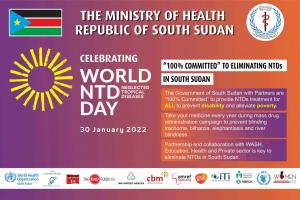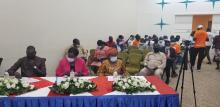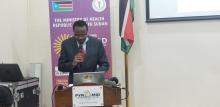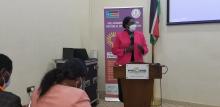Stakeholders recommit to enhance efforts to eliminate Neglected Tropical Diseases in South Sudan
Juba, 30 January 2022 - South Sudan joined the rest of the world to commemorate the first World Neglected Tropical Diseases (NTDs) Day, a day marked to boost the global fight against NTDs which have affected more than 1.5 billion people globally. Approximately one-third of these live in Africa with South Sudan being among the top countries experiencing huge burdens inflicted by this poverty induced diseases.
This year’s event is marked under the theme “achieving health equity to end the neglect of poverty-related diseases,” and is aimed to raise awareness on NTDs, maintain the momentum towards elimination and call upon all partners and stakeholders to work together towards this goal.
The event was organized by the Ministry of Health with support from the World Health Organization (WHO) and other partners, with attendance from high-level stakeholders, including senior government officials, donors, UN agencies, Academia, media, and civil society organizations, united to say no to all the inequalities that characterize NTDs.
South Sudan has a high burden of neglected tropical diseases such as elephantiasis, bilharzia, intestinal worms, river blindness, blinding trachoma, sleeping sickness, Kala-Azar, Buruli ulcer, rabies, mycetomas, and guinea worm. Its impact has reduced productivity and hence affect the socio-economic development of the country.
“Chronic infections, conditions and disability caused by these endemic diseases have caused illnesses and needless death and affect livelihoods of many families in South Sudan”, said Honorable Elizabeth Achuei Yol, Minister of Health. “With support from WHO and other partners, South Sudan is implementing necessary interventions to not only eliminate these chronic infections but is also supporting the care of those suffering the adverse consequences”.
However, to implement some of these lifesaving interventions more resources are needed to ensure effective response and management of cases. Hon. Achuei called on all stakeholders to re-energize and renew their commitment to ending the suffering from these diseases in South Sudan.
In his remarks, Dr Fabian Ndenzako, the WHO Representative a.i. for South Sudan pledged WHO’s continued commitment to support South Sudan to scale up the NTDs control efforts with the eventual aim of achieving prevention, control, elimination and/or eradication of these diseases in line with the World Health Organization roadmap for elimination of NTDs from Africa.
Great advances in reducing the presence of devastating chronic infections have taken place in South Sudan in the past few years. Infections that have been so common, such as river blindness first described in Wau almost 100 years ago.
Given the prevalence of the NTDs, the Ministry of Health with support from partners have implemented a population-wide distribution of treatments aimed at reducing and interrupting the presence of infections that cause trachoma, river blindness, elephantiasis, and intestinal works. Over 5 million people affected with some of the NTDs have been treated with safe drugs.
Notes to editors:
NTDs are a diverse group of conditions such as Buruli ulcer, Chagas disease, dengue and chikungunya, Guinea-worm disease, echinococcosis, foodborne trematodiases, sleeping sickness, leishmaniasis, leprosy, lymphatic filariasis, mycetoma, chromoblastomycosis and other deep mycoses, river blindness, rabies, scabies and other ectoparasitoses, schistosomiasis, soil-transmitted helminthiases, snakebite envenoming, taeniasis/cysticercosis, trachoma, and yaws and other endemic treponematoses.
NTDs are mainly prevalent in tropical areas, where they mostly affect impoverished communities and disproportionately affect women and children. These diseases cause devastating health, social and economic consequences to more than one billion people.
Technical contact:
Dr Mutale Nsakashalo Senkwe, Email: senkwem [at] who.int (senkwem[at]who[dot]int)
Communications Officer
WHO Rwanda
Mobile: +250 795 450 856
Email: ebrahimj [at] who.int (ebrahimj[at]who[dot]int)
Communication Officer
Mobile: +211 921736375
Email: atema [at] who.int (atema[at]who[dot]int)




